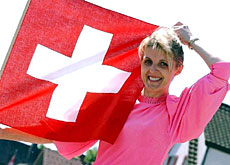Feeling Swiss is vital for new citizens

Voters will decide on September 26 whether to make it easier for young foreigners to obtain a Swiss passport.
But why bother to become Swiss? swissinfo went along to meet a couple of people who have actually taken the step.
Alba-Lucy Vinueza-Duque is a Colombian national who has lived in Switzerland for the past 19 years after coming here originally to pursue her studies.
Recently, she applied for Swiss citizenship along with her husband. She says she took the step because she now feels fully integrated.
“We speak French and also Italian,” she told swissinfo. “We have a lot of friends who taught us to love Switzerland and the Swiss, so we don’t have the feeling we just live here.”
Alba-Lucy, who works for an international organisation in Bern, says having a Swiss passport doesn’t mean she will lose her Colombian identity, but rather that she will gain an extra one.
“I can’t just be changed by a passport,” she explains. “But I have a different culture now and a different way of thinking, even if I don’t think a piece of paper will make me fit in with popular image of the Swiss.”
Roots
Bajrush Zeka, who works as a storeman for Migros, Switzerland’s biggest retailer, recently became a Swiss citizen. He came here as a refugee from Kosovo in the early 1990s after facing political persecution there.
He has turned his back on his birthplace and proclaims that Switzerland is the place to be.
“For a long time I didn’t have a homeland, even though people categorised me as a citizen of former Yugoslavia – something I couldn’t accept,” he told swissinfo.
“I’m proud to be Swiss now. I have some roots and when I meet someone, I can say I’m Swiss.”
Home sweet home
Both Alba-Lucy and Bajrush say they feel at home in Switzerland. But they also agree that just living here is not enough to say one is integrated: to truly become Swiss, language skills are vital.
“Where I live, people speak French, so I had to learn it,” says Bajrush. “It helped me not only find a job, but also new friends.”
Alba-Lucy points out that anyone who doesn’t speak one of the country’s national languages faces a huge handicap.
“I knew a couple from South America with Swiss passports who came here hoping to find work,” she recalls. “After a few months, they returned home because they realised they would never find a job without language skills.”
Political rights
For long-term foreign residents of Switzerland, the biggest change when they become citizens is the right to vote. This an important factor for many people, especially with the frequent votes held by the Swiss.
Bajrush says access to political rights is of the utmost importance to him.
“I had problems in Kosovo before I came here,” he reveals. “I had no rights there, not even to live the life I wanted.”
While Alba-Lucy has not faced the same problems, she too appreciates being involved in public life and being able to choose political representatives.
“I have felt frustrated until now,” she admits. “It’s like being invited into someone’s house and being told not to touch anything.”
Although both have followed the ordinary 12-year naturalisation procedure, they believe that a “yes” vote on September 26 will benefit Switzerland.
Foreigners’ contribution
Bajrush says it is important to encourage young foreigners who have studied in Switzerland to stay.
“I think they want to give something back to Switzerland and to do things for this country,” he says.
Alba-Lucy reckons that simplifying the rules all over the country is the right thing to do.
“In Switzerland, as a foreigner, you have to put up with administrative hassles year in year out, even if you were born here,” she explains. “Even a small child always remains a foreigner in the eyes of the law.”
They both agree that there are no real reasons to restrict access to citizenship, contrary to the views trumpeted by some rightwing politicians.
“There are some foreigners whose contribution has not been recognised, because they come from specific countries, despite living and working here for years,” says Alba-Lucy. “Some people just don’t want them to have Swiss citizenship.”
swissinfo, Scott Capper
Permanent residents in Switzerland numbered 7,383,000 in March 2004.
Foreigners numbered 1,518,600 (or 20.5%), of which 116,970 are second-generation.
About 18,000 babies are born to foreign parents in Switzerland every year.
An average of 37,000 people are naturalised every year.
Alba-Lucy Vinueza-Duque has lived in Fribourg for nearly two decades.
Married with two young daughters, she works for the Universal Postal Union as a computer specialist.
Bajrush Zeka lives in Bulle in canton Fribourg.
Trained as a laboratory technician in former Yugoslavia, he now works as a storeman at one of the local Migros centres.

In compliance with the JTI standards
More: SWI swissinfo.ch certified by the Journalism Trust Initiative












You can find an overview of ongoing debates with our journalists here . Please join us!
If you want to start a conversation about a topic raised in this article or want to report factual errors, email us at english@swissinfo.ch.